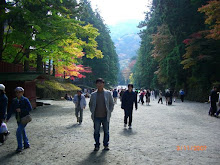 Almost half of Cambodia has been sold to foreign speculators in the past 18 months - and hundreds of thousands who fled the Khmer Rouge are homeless once more.
Almost half of Cambodia has been sold to foreign speculators in the past 18 months - and hundreds of thousands who fled the Khmer Rouge are homeless once more.Cambodia is a nation that would drown if their boat tipped over; it is also a country whose citizens mostly do not belong to the places where they have ended up. The Khmer Rouge saw to that, eviscerating the kingdom after coming to power. Below are some highlights extracted from the long article:
- Forty-five per cent of the country's entire landmass has been sold off - from the land ringing Angkor Wat to the colonial buildings of Phnom Penh to the south-western islands. By 2006, the World Bank estimated that 40,000 had been made homeless in Phnom Penh alone.
- Rumours were buzzing around Sihanoukville's covered market that virtually every island in the region was up for sale. Over the following months, Koh Russei and Koh Ta Kiev, Koh Bong and Koh Ouen, Koh Preus, Koh Krabei and Koh Tres were all snapped up by foreigners, who then started negotiating for mainland sites, too, among them public beaches with names such as Serendipity, Occheuteal and Otres.
- The troubled kingdom of Cambodia had suddenly found itself a refuge for cash and speculators fleeing paralysed western financial markets.
- Foreign fund managers had started pitching up in Phnom Penh, alerted by the country's unexpected boom in tourism. Their interest was land speculation: buying up large sites in developing countries that they would then sit on in the hope that, with the influx of tourists, land values would soar.
- Hun Sen and his ruling CPP have, in effect, put the country up for sale. Crucially, they permit investors to form 100% foreign-owned companies in Cambodia that can buy land and real estate outright - or at least on 99-year plus 99-year leases. No other country in the world countenances such a deal. Even in Thailand and Vietnam, where similar land speculation and profiteering are under way, foreigners can be only minority shareholders.
- Many foreign funds - hedge funds, property funds, private equity funds - operating on the outer margins of the financial world thrive on complexity, risk and maximising profit. In Phnom Penh, they found an ideal partner in the prime minister, who has created a unique business environment. Since the mid-90s, Hun Sen and the CPP have declined to enforce money-laundering legislation and have concerned themselves little with the probity of investors. Foreign businessmen were offered nine-year tax holidays, and were allowed to hold their cash in US dollars in banks outside the country.
- In July 2007, Hun Sen, gambling on his people's tenuous connection with the land, changed the designation of the southern islands so they could be sold. The forests, lakes, beaches and reefs - and the lives of the thousands of residents - were quietly transferred into the hands of private western developers.
- It was Hun Sen who, as early as 1989, realised the power of land. As he privatised the land, "he simultaneously cut off the rights of 360,000 exiled Cambodians, awarding prime slices to political allies and friends." Although he bathes his speeches in socialist values, even his closest aides told us that Hun Sen was more often than not a pragmatist.
- The investors could have sold up and come away rich. But this was development with a difference. They were speculating on the future value of the land, believing that by adding only modest infrastructure, perhaps attaching big-name hoteliers, they would reap vast profits in seven to 10 years.
- Since the land sell-offs, members of the government and its allies have been splashing huge sums around. A Korean developer told us that when he marketed Phnom Penh's first skyscraper, the 42-storey Gold Tower project in February, all two dozen £750,000 penthouse suites were bought within 24 hours by "an honour roll of the CPP and its friends in the military".
- Simon Taylor, the director of Global Witness, an international NGO that was forced to leave the country last year, having accused the CPP of running a logging racket, paints a depressing picture: "A shadow state has grown up, a government that misappropriates public assets, extorts from businesses and manages an extensive illicit economy.
- Has the legacy of the Khmer Rouge been purged? Naly Pilorge, director of Licadho, a local human rights NGO, thinks not: "Everyone claims Cambodia has come through the period of barbarism, but the sadism is still bubbling beneath the surface. Extreme violence, greed and disregard for the most basic human rights - of giving people a place to live - are still with us daily. The methods of the past are being used to dictate our future."

No comments:
Post a Comment